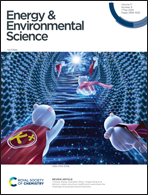Degradation of sodium co-intercalation chemistry and ether-derived interphase on graphite anodes during calendar aging†
Abstract
Graphite anodes with a solvent co-intercalation mechanism exhibit excellent kinetics and cycling stability in sodium-ion batteries. However, the dramatic volume changes caused by solvent participation are challenging for interphasial conformality. Herein, we reveal the intercalation compound degradation and solid electrolyte interphase (SEI) evolution of graphite at different sodiated states via capacity loss and fluctuation of Coulombic efficiency (CE) induced by calendar aging. Abnormal calendar aging dependent on sodiated states is found, and it appears as more severe capacity loss and lower CE in partially sodiated graphite anodes. The deteriorated performance results from its high-staged intercalated phase transition accompanied by huge volume shrinkage. Under the effect of intercalation degradation, the growth and destruction of SEI coexist on the partially sodiated graphite, whereas growth-dominated SEI is found on fully sodiated graphite. Using X-ray photoelectron spectroscopy (XPS) and nuclear magnetic resonance (NMR) spectroscopy, we distinguished that the evolution of ether-derived SEI is dominated by alkoxides. These findings reveal the abnormal calendar aging of a graphite anode in an ether system, providing new insights into its interphasial stability.



 Please wait while we load your content...
Please wait while we load your content...